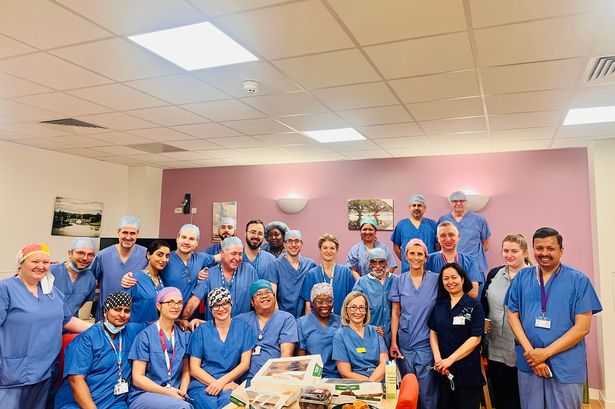The United Kingdom stands at the forefront of medical history with the successful completion of its inaugural womb transplant procedure, a monumental achievement that opens a new chapter in reproductive medicine. A team of dedicated surgeons at the Churchill Hospital in Oxford accomplished this groundbreaking feat, marking a triumphant moment for women facing complex reproductive challenges.
On a momentous Sunday, surgeons undertook an intricate operation that spanned over nine hours and twenty minutes. The procedure involved transplanting a sister’s womb into her 34-year-old sibling, who had been diagnosed with the rare Mayer-Rokitansky-Kuster-Hauser (MRKH) condition, a disorder affecting the female reproductive system. This revolutionary intervention has redefined the possibilities for women dealing with similar conditions.
The surgical endeavor, led by the skilled hands of lead surgeon Richard Smith and co-surgeon Isabel Quiroga, demanded meticulous precision and a profound understanding of the human anatomy. The donor’s womb was carefully removed during a procedure lasting more than eight hours, and the subsequent transplantation procedure was executed with equal mastery. The unwavering dedication of the surgical team was evident as they achieved a feat that will undoubtedly reshape the landscape of reproductive medicine.
In a heartfelt expression of the success, Smith shared his sentiments with the UK’s Press Association, stating, “It was incredible. I think it was probably the most stressful week in my surgical career but also unbelievably positive.” The emotional impact of the achievement reverberated through his words, emphasizing the transformative nature of the procedure.
Central to the success of the transplant was the donor, a 40-year-old woman who had previously given birth to two children. Her willingness to selflessly donate her uterus to her sibling illuminated the profound depth of familial bonds and the potential for medical innovation to bridge gaps in reproductive challenges.
Quiroga, another lead surgeon integral to the operation’s success, confirmed the remarkable functionality of the transplanted womb. “The recipient’s womb was functioning perfectly,” she noted, underscoring the remarkable progress achieved through this pioneering endeavor. With this triumph, the recipient’s dream of motherhood has materialized, a dream that had been nurtured by storing embryos in anticipation of future in vitro fertilization (IVF) treatments.
However, this journey towards parenthood comes with its own set of medical considerations. The transplanted womb is projected to remain viable for a maximum of five years, during which the recipient will need to take immunosuppressant drugs to prevent rejection. The achievement of pregnancy is now a realistic aspiration, as Smith elucidated, “Hopefully that embryo will take, and hopefully nine months later she’ll [have a] Caesarean section.”
Looking beyond childbirth, the recipient will make pivotal decisions about her future. Following a successful childbirth through Caesarean section, she will face the choice of undergoing a complete hysterectomy or embarking on another pregnancy six months later.
Kate Brintworth, the chief midwifery officer of NHS England, conveyed her heartfelt well-wishes to both the donor and recipient, acknowledging the monumental significance of this achievement.
This historic milestone positions the United Kingdom alongside pioneering nations such as the United States and Sweden, where womb transplant procedures have been previously conducted. Quiroga affirmed that the success of this procedure has sparked increased interest among women inquiring about the possibility of donating their uteruses, offering a glimmer of hope to countless others grappling with similar challenges.
In a world where medical advancements continue to redefine the boundaries of our possibilities, this achievement stands as a testament to human ingenuity and compassion. The story of the UK’s first womb transplant reminds us of the immense potential of medical science to create transformative change and provide new avenues of hope for those in need.



